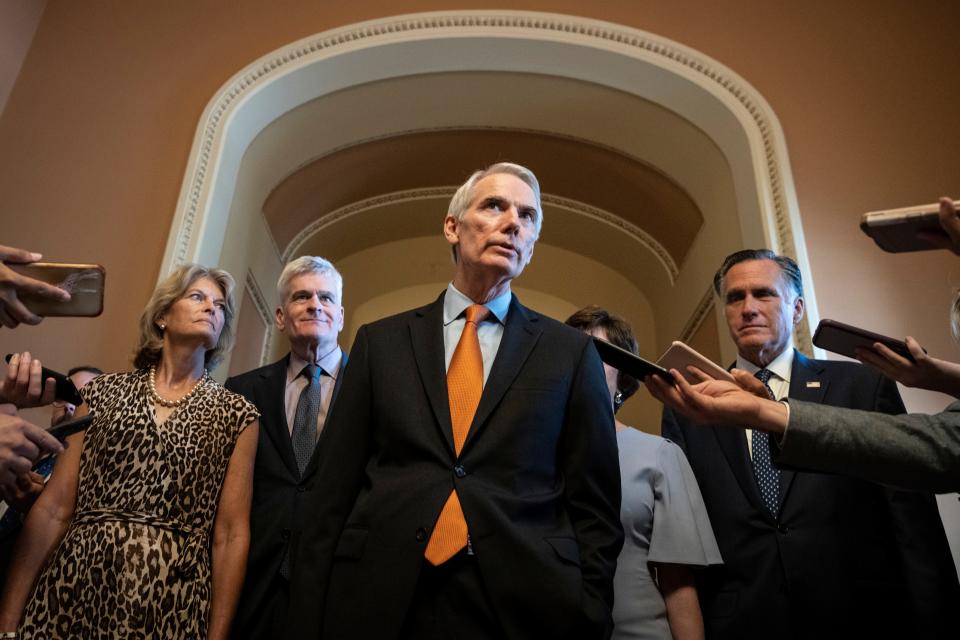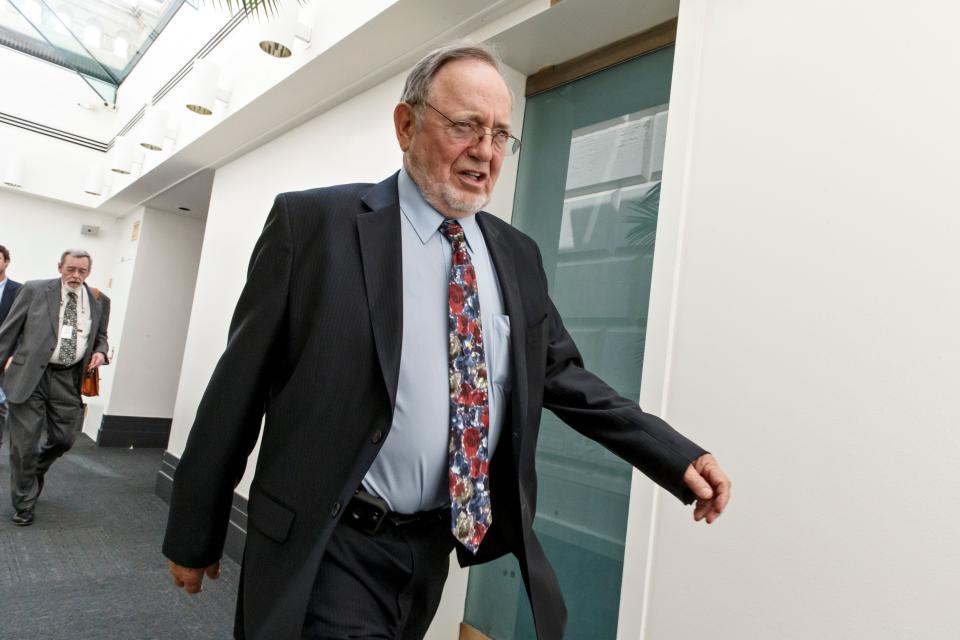32 Republicans voted for Biden's infrastructure bill. Here's who attended the signing ceremony
WASHINGTON — Several Republican lawmakers were scheduled to attend President Joe Biden's ceremony at the White House where he will sign his $1.2 trillion infrastructure bill into law.
The legislation passed with support from most Democrats as well as 19 Republican senators and 13 GOP House members. The latter have faced a backlash, with their votes getting scorned by former President Donald Trump, who slammed the House members as "RINOs" who "should be ashamed of themselves."
Biden invited everybody who supported the bill "because he felt that was the right thing to do," White House press secretary Jen Psaki said Monday.
"Whether people come or not, that's their choice," she said.
The following Republicans were expected at the ceremony:

A 'game changer'?: Mayors, governors ready to compete for $1 trillion in infrastructure funds
Sen. Lisa Murkowski of Alaska
The independent-minded Murkowski announced her 2022 re-election bid days after touting the passage of the infrastructure bill as important to grow the economy and create jobs.
“I will work with anyone from either party to advance Alaska’s priorities,” she said in her kick-off video.
Murkowski, the only GOP senator facing reelection who voted to convict Trump at his impeachment trial, is being challenged in the primary by a Republican backed by Trump.
Murkowski was part of the bipartisan group of lawmakers that negotiated the infrastructure package with the White House.

Sen. Rob Portman of Ohio
The notoriously-congested Brent Spence Bridge, which connects Cincinnati to northern Kentucky across the Ohio River, has for years been an often-pointed to example of why America’s infrastructure needs upgraded.
“We’re gonna fix that damn bridge of yours going into Kentucky,” President Joe Biden said during a visit to Cincinnati in July.
Portman, who is retiring when his second term expires in 2022, helped negotiate the package that’s being signed into law.
In addition to the package providing the tools to “fix this long-running traffic headache once and for all,” Portman has said it will make the nation more productive and competitive against other countries like China.
And as Republicans are increasingly attacking Biden over rising inflation, Portman has described the bill as "counter-inflationary” because it makes long-term investments in ports, railroads, roads and other assets.
Sen. Shelley Moore Capito of West Virginia
Capito is the top Republican on the Senate Committee on Environment and Public Works, which has jurisdiction over highways and other public work projects.
She’s said the infrastructure package includes significant wins for West Virginia including providing help to finish Corridor-H and to connect communities to the internet.
She also praised what she called the give-and-take among Democrats and Republicans to craft the final version.
“This bill is further proof that this bipartisan process leads to better, lasting policy that will benefit the American people for generations to come,” she said after House passage.
When I helped craft the bipartisan infrastructure package, I made certain that West Virginia received the core infrastructure support we need.
This bill will help finish Corridor-H, connect communities to the internet, and creates jobs across our state. https://t.co/cJpvwQSPH3— Shelley Moore Capito (@SenCapito) November 13, 2021
Capito was re-elected to a second term in 2020 with 70% of the vote.
Sen. Bill Cassidy of Louisiana
Cassidy was among the bipartisan group of senators who helped craft the infrastructure bill.
The Louisiana Republican has said the bill is a “major victory” for his state, as well as the nation. He noted the bill would help protect Louisiana -- which has been hit several times by major hurricanes -- in future natural disasters.
“This infrastructure package will rebuild our roads and bridges, increase access to high-speed internet, strengthen our electric grid, add levee protection, and improve flood resiliency,” Cassidy said in a statement after the House passed the bill. “After almost every corner of our state was hit by natural disasters in the last year, we must have the federal investment to protect us from future storms.”
Despite Cassidy’s support for the infrastructure bill, he has been vocal about how his opposition to the Build Back Better budget legislation.
“This bipartisan bill is the right way to reinvest in our country, unlike Democrats reckless tax-and-spending spree, which I continue to strongly oppose,” he said in a statement.

Sen. Susan Collins of Maine
Collins is used to being in the middle of negotiations when Democrats look for allies across the aisle.
On infrastructure, Collins said she and nine other senators “were determined to break through the partisan gridlock and pass this long-overdue infrastructure investment for the American people.”
“Congress has talked about truly modernizing our nation’s infrastructure for as long as we can remember,” Collins and the bipartisan co-negotiators said in a joint statement after the Senate passed the bill.
Collins said she worked with Sen. Jeanne Shaheen, D-N.H., on the bill’s broadband provisions to expand high-speed Internet access to rural and unserved areas of their states. After being a top target of Democrats in 2020, Collins was re-elected to a fifth term with 51% of the vote.
Sen. Mitt Romney of Utah
The Utah Republican, who was among a bipartisan group of lawmakers who helped negotiate the bill, will be in attendance Monday.
Romney has said the bill will include “historic investments that will benefit Utan and rebuild our nation’s physical infrastructure.”
“This legislation shows that Congress can deliver for the American people when members from both sides of the aisle are willing to work together to address our country’s critical needs,” Romney said in a statement Monday.
Since the bill has passed the House, Romney has highlighted how the bill will help Utah’s water supply and roads and highways.
“All of us are responsible for serving the people of our state and our community—and our state is growing,” Romney said during a stop in Central Utah, according to a local ABC station. “It’s essential that we have the water that we have the rights to and that we use the water in a way that’s appropriate and responsible.”
Rep. Tom Reed of New York
Reed may not be running for reelection during next year’s midterm election, but he has said that did not affect his vote.
“I voted for this infrastructure bill because it was the right thing to do for the American people,” he said during an interview on NewsNation last week.
Reed said earlier this year that he would not be running for reelection following sexual misconduct allegations. Reed has denied the allegations.
The New York Republican, who is a member of the bipartisan Problem Solvers Caucus, has made infrastructure a key policy during his tenure in Congress. He said during a radio interview last week that he was “glad to vote for” this bill.
“It was actually 10 years in the making,” Reed said. “It's time we stopped putting partisan politics as a motivating factor for everything that we do in Washington and do some things that are good for the American people, like this infrastructure bill.”

Rep. Don Young of Alaska
Young, who announced he was running for reelection in late April,
was one of 13 GOP members who voted for the bill earlier this month. In a statement following his vote, he noted that the bipartisan bill “may be our last best chance to make the federal investments necessary to modernize and strengthen America's infrastructure needs for the next century and beyond.”
“Was this bill perfect? No, but truthfully, few pieces of legislation are,” he said in the statement. “However, I firmly believe that we cannot sacrifice the good for the perfect. Very frankly, inaction on infrastructure risks our nation's fundamental economic independence and strength.”
Which Republicans did not attend?
Senate Minority Leader Mitch McConnell, R-Ky., did not attend the White House ceremony despite voting for the package. Here are the other GOP senators who backed the bill but were not expected to attend the signing:
Missouri Sen. Roy Blunt
North Carolina Sen. Richard Burr
North Dakota Sen. Kevin Cramer
Idaho Sen. Mike Crapo
Nebraska Sen. Deb Fischer
South Carolina Sen. Lindsey Graham
Iowa Sen. Chuck Grassley
North Dakota Sen. John Hoeven
Idaho Sen. James Risch
Alaska Sen. Dan Sullivan
North Carolina Sen. Thom Tillis
Mississippi Sen. Roger Wicker
Here the GOP House members who voted for the package but were not expected to attend the signing ceremony.
Nebraska Rep. Don Bacon
Pennsylvania Rep. Brian Fitzpatrick
New York Rep. Andrew Garbarino
Ohio Rep. Anthony Gonzalez
New York Rep. John Katko
Illinois Rep. Adam Kinzinger
New York Rep. Nicole Malliotakis
West Virginia Rep. David McKinley
New Jersey Rep. Chris Smith
Michigan Rep. Fred Upton
New Jersey Rep. Jeff Van Drew
This article originally appeared on USA TODAY: Which Republicans will attend Biden's infrastructure bill signing?

 money
money 